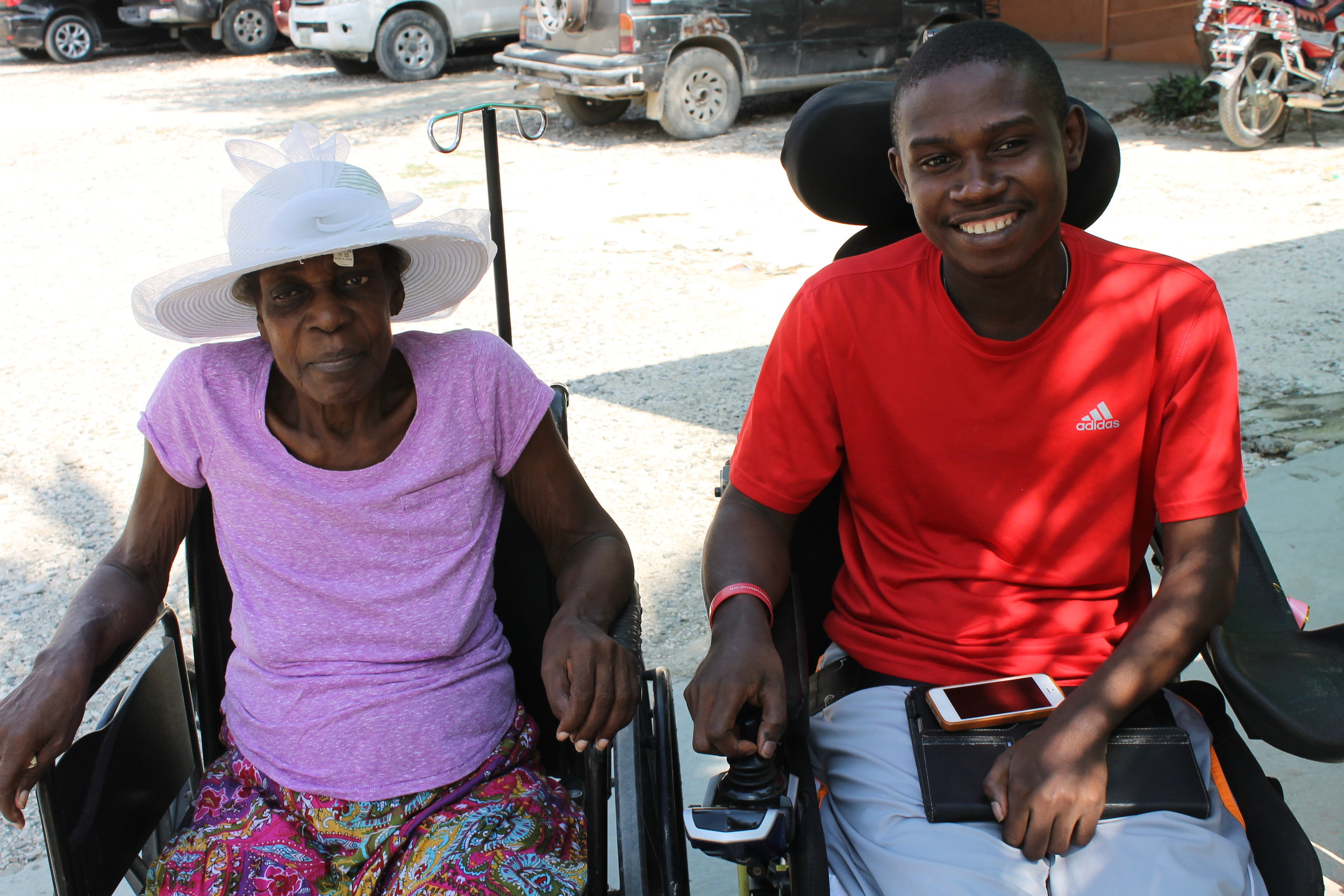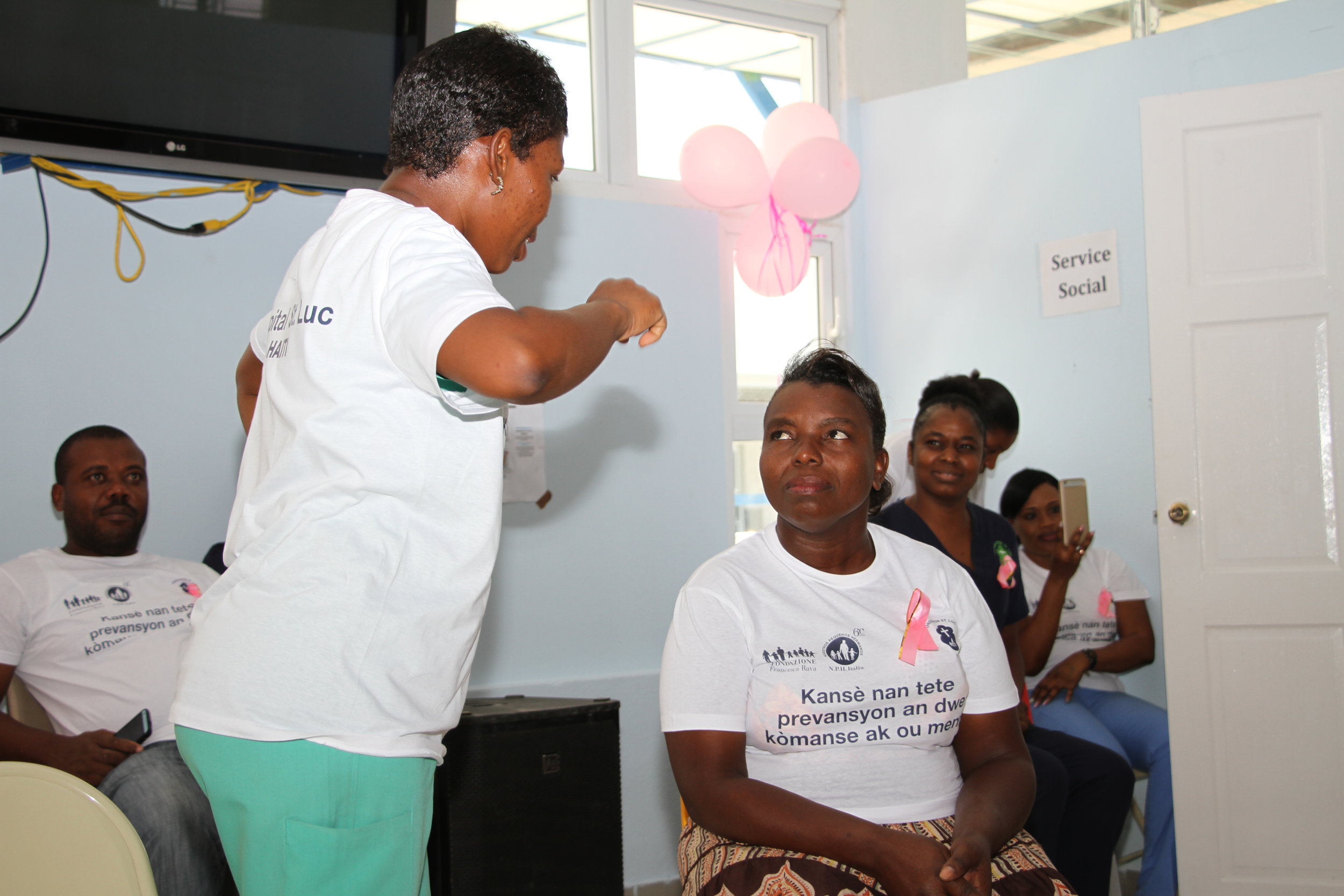Social Services at St. Luke Hospital
/“He is my father,” Pierre, a middle-aged patient says as he points to Wilflo Fontus, his visibly younger social worker at St. Luke Hospital, “he is my brother; my friend.” Pierre was left at the hospital, abandoned by his family. There was no relative willing to bring him food, clothing, or medicine until the social services team, consisting of Wilflo, Rachelle Petiote, and Yolette Senat, stepped in. These three become like family to their most vulnerable patients.
“That is the thing I like best about my job,” Wilflo explains, “when the patients come to view me as their family. When I help others, I forget about my own pain.”
Four years ago, everything about Wilfo’s life changed when he was the victim of a terrible act of greed and violence that left him almost completely paralyzed with only the use of his right hand remaining. After Wilflo had recovered and began to adjust to his new normal, he doubted that his life could hold anything meaningful.
“I didn’t want to see anybody. I felt ashamed. I wanted to be left alone, but then God changed my mentality.”
As Wilflo continued recovering, he remembered times before his injury when he had seen and felt compassion for patients who had no food or family. This recollection sparked the idea to provide social services at the hospital, and Wilflo took this proposal to Fr. Rick and Dr. Augustin, who helped him plan, brainstorm, and create a budget to get things started. With the help of Yolette, Social Services at St. Luke Hospital became a reality.
Yolette worked as a nurse’s aid when cholera hit Haiti. After that she continued working in the hospital, and each day as she visited each of her patients, she would talk with them and educate them on how to prevent diseases like cholera, malaria, HIV, and tuberculosis. The nurses she worked with noticed her talent and passion for education, and chose her to be the first social worker at the hospital. Now, with the biggest smile, she continues to teach patients about disease prevention and how to live healthy lives.
When Wilflo first started working as a social worker at the hospital, the most challenging thing for him was overcoming the preconceived notions of others, in his case, the idea that someone living with a disability can’t help other people.
“Sometimes I would see someone who was crying and needed help, but when they saw my wheelchair they would say to me, ‘I can’t help you, and you can’t help me!’ because they always thought that I was the one who needed help!” Now Wilflo just laughs as he makes phone calls contacting patients’ family members or to get their medicine, writes receipts when the office covers meals for patients who have been abandoned, and works with the nurses each day to find and assist any patients who are at the hospital alone. Although there are many obstacles Wilflo has had to overcome, he has overcome them with grace, compassion, and kindness.
Rachelle also visits with the patients everyday to assess their needs, paying special attention to the patients who can’t even afford to buy food or patients who have no family at the hospital to help care for them. Sometimes, patients just need someone to talk to, she explained, they just need a friend. The hardest part about working with social services, she said, is when the office is limited and they can’t help everyone who needs help. Wilflo agreed. In the beginning, St. Luke didn’t charge its patients for their care, but this model became unsustainable for the hospital to continue running, and now patients must pay a small fee. The first 24 hours of care are free at the hospital, but after that timeframe, patients must pay the equivalent of about $9US per day. In a country where many people survive on less than that, these bills can become burdensome quickly. In addition to hospital fees, patients must also cover the cost of their medications.
In Haiti, it can be hard to discern who needs the most help...because everyone needs help, so the Social Services office at St. Luke hospital requires patients to make as much effort as possible to pay their own bills. Recently, Fr. Hugo met a woman at mass who couldn’t afford to pay the final hospital bill for her dying mother. Her mother had been in a coma for a month, and there was no more the hospital could do. The woman simply wanted to take her mother home to die. When she came to the office, she held in her hand a stack of papers, evidence that she had faithfully paid for all her mother’s medicines; she just couldn’t afford the final hospital bill. Upon seeing her attempts to pay for her mother’s medical needs, the social services team agreed to help with the final bill.
It is hard to find the balance, Wilflo explained. If he could, he would like to help everybody who comes into the office, including hospital staff who sometimes need assistance as well, but patients, such as Pierre, the ones who have been abandoned or truly have nothing—not even money for food—are the office’s highest priority.
The Social Services at St. Luke are funded by the central administration of the St. Luke Foundation, Fr. Rick and Fr. Enzo, friends of St. Luke and international friends of Wilflo. It truly is a team effort. If you too would like to help support this work at the St. Luke hospital, please consider leaving a donation below and marking it for Social Services!





